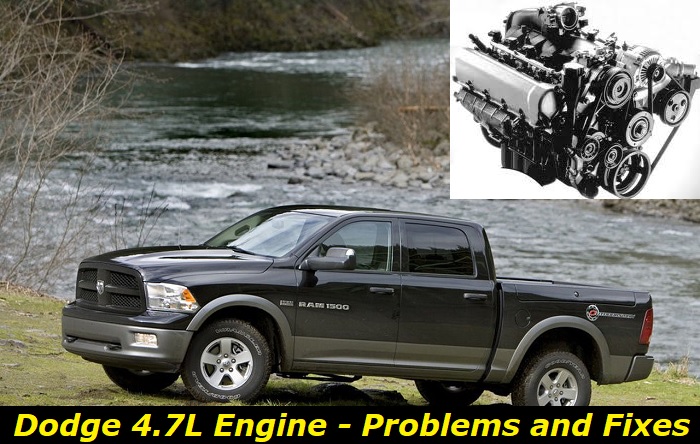The Dodge 4.7L engine has seen many applications during its production years. Also known as the "Magnum engine" and PowerTech, it was a staple in some models of Jeep, Dodge, Chrysler, and Mitsubishi from 1999 to 2009.
The Dodge 4.7L gained recognition as one of Ward's 10 Best Engines in 1999 because of its reliability, and thus, it enjoyed a pretty high demand in the market. Despite, its accolades and warm reception though there have been issues closely linked with it. So, in this article, we will weigh in on the matter of whether or not the engine is as dependable as it used to be.

Key facts and my opinion about the engine
- Production years: 1999-2013
- Average lifespan of 4.7L: 230,000-280,000 miles
- Fuel supply type: port injection (sequential)
- Power range: 210-235 hp
- Fuel efficiency: bad
- Engine block material: cast iron
- Engine reliability score: medium
- The most common problems: issues with lubrication (thin oil passages), valve seats issues, weak three-chain timing system
Most Common Problems Found on the Dodge 4.7L Engine
A lot of people have high regards towards the Dodge 4.7L engine, and there have only been a few horror stories associated with it. That does not mean it's impervious to problems though, and one of the key issues commonly raised by a number of owners about it is related to overheating.
There are so many factors that can come into play when it comes to an overheating vehicle. In the case of the Dodge 4.7L, however, they have mostly been pinpointed to the following:
1. Coolant Leaks
Coolant leaks are one of the most common problems that can lead to overheating in Dodge 4.7L engines. There are some parts where coolant leaks can occur, and each has its own set of symptoms that you should know about.
One area where the coolant leak is usually located in the Dodge 4.7L is the radiator. A radiator leak can cause the engine to overheat by allowing coolant to escape from the system. Radiator leaks can be caused by different things, including a loose radiator cap, a damaged radiator, or a leaking hose.
Radiator leaks can also be caused by a build-up of sediment in the bottom of the radiator. This type of leak is relatively easy to fix in the hands of a qualified mechanic, and can often be repaired with a simple patch kit.
The fix here normally involves tightening the radiator cap or replacing it if it's already worn. It can also be cleaned if it's only contaminated by foreign debris, which can be accomplished by spraying pressurized water into it using a garden hose and some soapy water. However, if the radiator or its hose have already been damaged, they will need to be replaced.
Coolant leaks can also be caused by a number of other things, including a faulty thermostat, and a leaking water pump. These types of leaks can often be fixed by replacing the part that is causing the problem. In some cases, however, coolant leaks can be due to more serious problems, such as engine damage.
No matter what the cause is, if you suspect that your car has a coolant leak, it is important to have it checked out by a qualified mechanic as soon as possible. Ignoring a coolant leak can often lead to more serious problems, and can even cause your engine to seize up.
2. Blown Head Gasket
Another common source of a coolant leak in the Dodge 4.7L is a blown head gasket. While this is related to the first item, we believe that this one deserves its own spot here because of the numerous complaints specifically centering on it.
A head gasket leak can be much more serious than a radiator leak, and can often lead to engine damage. Head gasket leaks are caused by a failure of the seal between the cylinder head and the engine block.
This type of leak can allow coolant and oil to mix, which can cause the engine to overheat. Head gasket leaks can also be caused by a build-up of pressure in the engine, which can result in the failure of the gasket. Head gasket repairs or replacement can be very expensive, and often require the replacement of the entire engine if it has been compromised.
The head gasket in the Dodge 4.7L engine is crucial to the performance of the engine. The head gasket seals the combustion chamber from the crankcase, preventing oil and coolant from leaking into the cylinders. It also helps to distribute heat evenly throughout the engine, preventing hot spots that can cause engine damage.
A properly functioning head gasket is essential to keeping your engine running at its best, hence, any issues found there should be addressed immediately.
3. Damaged Valve Cover
The valve cover is a metal cover that sits on top of the engine and houses the valves. It seals the engine off from the outside world and keeps the oil in.
When the valve cover on a Dodge 4.7L engine becomes damaged, it can trigger a number of problems that may eventually lead to overheating. The most common symptom is oil leaking from the valve cover, which can cause the temperature of the engine to rise up dramatically if not addressed quickly. Other symptoms include a burning oil smell, smoke coming from the engine, and decreased engine performance.
The most common cause of a damaged valve cover is an oil change that was not done properly. If the oil was not drained completely or the new oil was not added correctly, it can cause the valve cover to become damaged. Another possible cause is a problem with the gasket that seals the valve cover to the engine block. This gasket can become cracked or damaged, which will allow oil to leak.
The only way to properly fix a damaged valve cover is to replace it. This is usually a fairly simple and inexpensive repair. However, if the damage is severe, it may require the replacement of other parts as well, such as the gasket or engine block. In worst-case scenarios, the entire engine may need to be rebuilt or replaced.
4. Valve Seat Failure
The valve seat helps the valve to close completely and seals the combustion chamber. If the valve seat fails, it can cause the engine to heat up excessively.
If your Dodge 4.7L engine is overheating, check for cracking or warping in the valve seats, which may be causing the valves to become misaligned. This can lead to poor compression and decreased efficiency, resulting in the said situation.
There are several possible causes of this problem, including improper installation, age-related wear and tear, or use of low-quality materials. To fix the issue, you may need to replace the damaged parts with new ones. In some cases, the entire engine may need to be replaced if the damage is too severe.
If you think your engine is suffering from valve seat failure, take it to a qualified mechanic for inspection and repairs. With proper care, your engine should be able to last for many years to come.
Longevity of the Dodge 4.7L Engine
The Dodge 4.7L engines in circulation nowadays are already between 13 to 23 years old. Surprisingly, some of them survived the passage of time with only minor repairs and regular maintenance. This speaks a lot about its resiliency as a power unit.
Meanwhile, when it comes to mileage, many claims to have logged between 200,000 to 300,000 miles in their vehicles that are equipped with the engine. But then again, we highly advise proceeding with a lot of caution when buying versions of the engine in the market at present due to the fact that many of them have already undergone major overhaul or rebuilding.
We are not against buying these, although you have to exercise due diligence when shopping for them. If possible, have a trusty mechanic by your side who will help you assess the condition of the Dodge 4.7L engine that you are looking to acquire to ensure that you will have the best value for your money.
Dodge 4.7L Engine Specs
During its run, the Dodge 4.7L engine has undergone several revisions until it was eventually replaced by the 3.7L EKG engine. It started off as a naturally-aspirated, cast-iron block with aluminum heads, V8 engine.
The unit utilizes a chain-driven single overhead camshaft (SOHC) with a bore of 3.66 inches and stroke of 3.405 inches taking a compression ratio of 9.6:1 and 9.8:1 in the revised version.
In its first-generation series, the Dodge 4.7L was already producing a pretty decent output amounting to 235 hp and 295 lb-ft of torque. Later on, it evolved into the "High-Output" (HO) version with 265 hp and 330 lb-ft of torque. As a last hurrah, the product's final form came with up to 310 hp and 334 lb-ft of torque.
Among the popular vehicles that held the Dodge 4.7L engine were the 1999-2009 Jeep Cherokee, 2002-2008 Jeep Grand Cherokee, 2006-2009 Jeep Commander, 2000-2008 Dodge Dakota, 2000-2009 Dodge Durango, 2002-2008 Dodge RAM 1500, 2007-2009 Chrysler Aspen, and the 2006-2007 Mitsubishi Raider.
Conclusion
Many issues experienced by current owners of the Dodge 4.7L have something to do with the regular wear and tear of the engine, and not due to its poor engineering. Therefore, it remains our top pick for engine replacement or swaps. Just be sure to submit it for regular maintenance, and you should be good to go!
About the authors
The CarAraC research team is composed of seasoned auto mechanics and automotive industry professionals, including individuals with advanced degrees and certifications in their field. Our team members boast prestigious credentials, reflecting their extensive knowledge and skills. These qualifications include: IMI: Institute of the Motor Industry, ASE-Certified Master Automobile Technicians; Coventry University, Graduate of MA in Automotive Journalism; Politecnico di Torino, Italy, MS Automotive Engineering; Ss. Cyril and Methodius University in Skopje, Mechanical University in Skopje; TOC Automotive College; DHA Suffa University, Department of Mechanical Engineering






Add comment